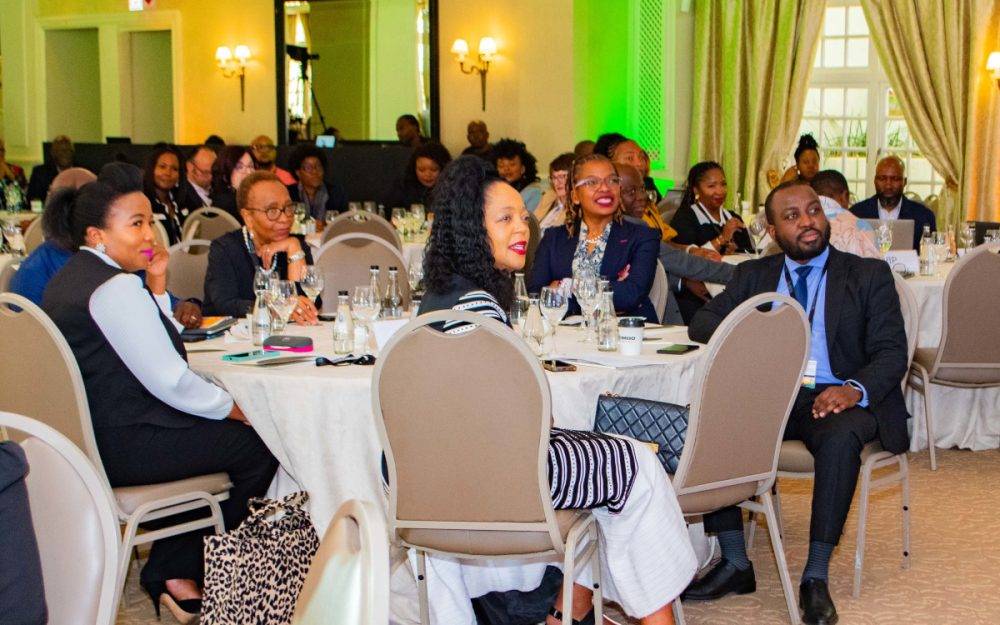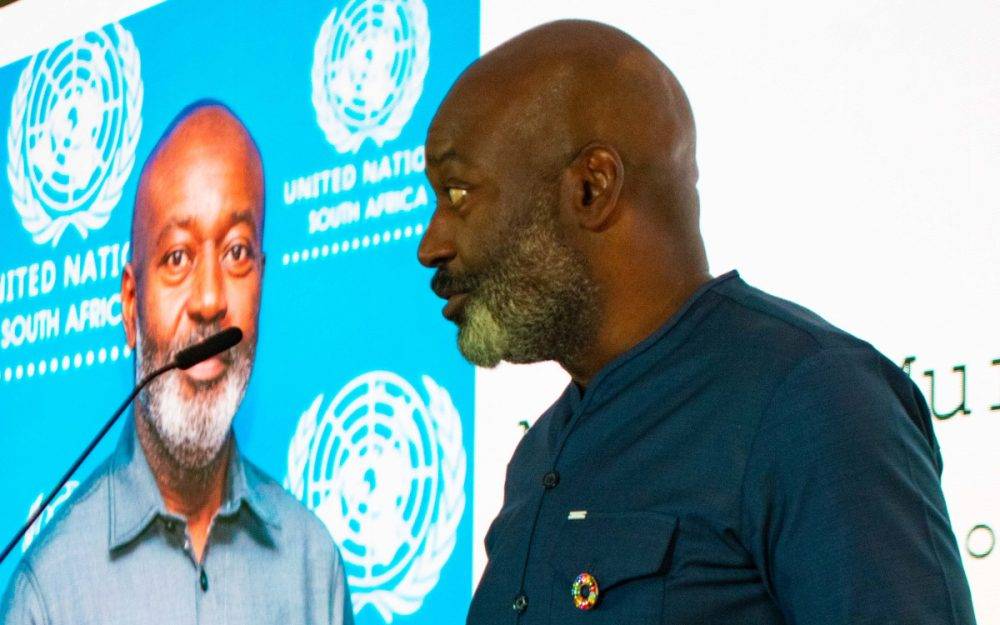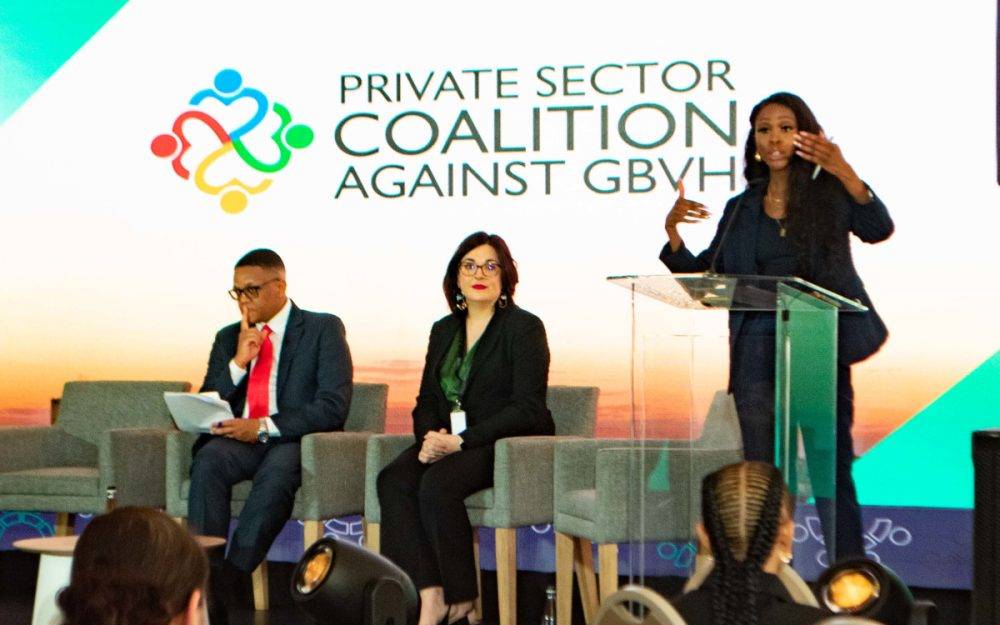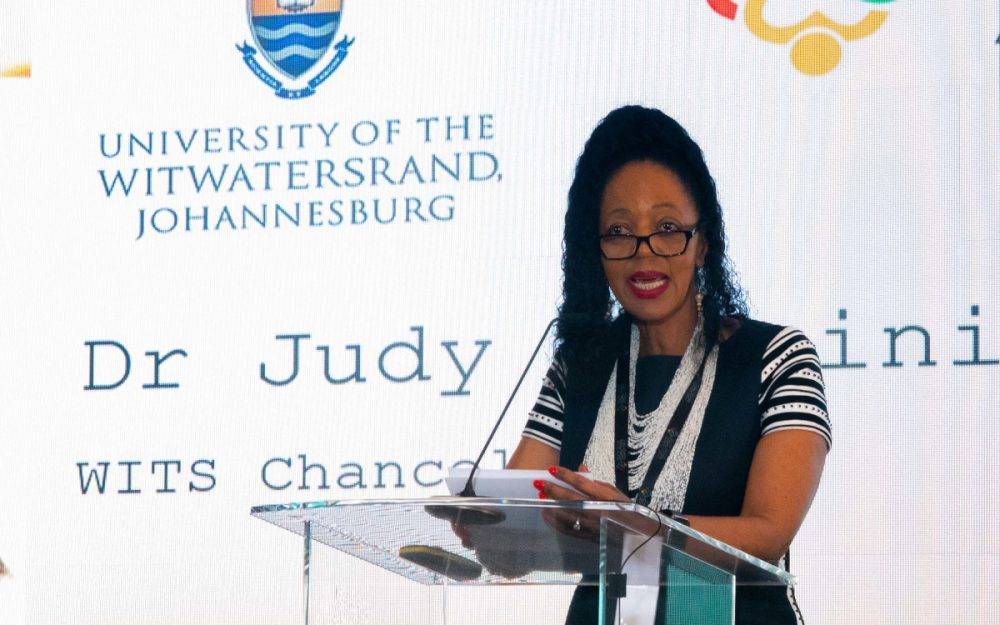Advocate Shamila Batohi addresses the Private Sector Symposium against Gender-Based Violence and Femicide. File photo
The Private Sector Coalition brings SA businesses together to fight the scourge of gender-based violence and harassment
The Gender-Based Violence and Femicide Response Fund (GBVF RF) held a Private Sector Symposium against Gender-Based Violence and Femicide (GBVF) in conjunction with the SABC and the Mail & Guardian in August 2024 in Sandton, Johannesburg, at which the Private Sector Coalition Against Gender-Based Violence and Harassment (PSC) was launched.
The PSC provides a collaborative platform for companies to tackle gender inequality and workplace violence. GBVF RF Chairperson Faith Khanyile said that the PSC is being formed to help put an end to GBV. It will help businesses develop standards and best practices to prevent and address GBVF, encouraging companies to adopt a three-step framework supported by ILO C.190 convention, which includes prevention, protection, and enforcement to create safer workplaces. Nelson Muffuh, UN Resident Coordinator, said: “As businesses that promote gender equality and prevent GBV thrive, others will be compelled to join in this effort.”
The symposium brought together key players such as the Presidency, the International Labour Organisation (ILO), UNFPA, UN Women, Vodacom, Anglo American, Spar and the JSE. The creation of the PSC follows the Second Presidential Summit on GBVF in November 2022, in which a greater private sector role was called for.
 Audience members at the Private Sector Symposium at which the Public Sector Coalition was launched.
Audience members at the Private Sector Symposium at which the Public Sector Coalition was launched.
There was unanimous agreement on the fact that GBVF and Gender-Based Violence and Harassment (GBVH) in the workplace and elsewhere is a “second pandemic” that must be ended. Dr Judy Dlamini, Chancellor of Wits, said that GBVH affects all sectors of society, and that “only a sick nation attacks its women”. Cosatu President Zingiswa Losi said that South Africa is severely affected by GBV, femicide and workplace harassment, which is “frighteningly rife”.
Frequent reference was made to the Thuthuzela Care Centres, which are an effective and critical part of South Africa’s anti-rape strategy. The NPA’s Advocate Shamila Batohi said they reduce secondary victimisation, create a victim-friendly environment, provide comprehensive pretrial services, and have resulted in increased conviction rates for reported rape cases. Support for these centres is coming not only from the government but also from the private sector, among several other initiatives, which demonstrate that it is increasingly stepping up in the fight against GBV.
Speakers and summaries
MC Faith Mangope opened proceedings, introduced some of the speakers and lauded the private sector for its role in fighting GBV.
Faith Khanyile, GBVF RF Chairperson, said the gathering was unique, as the private sector had never before gathered before in this way to fight the scourge of GBV. She said her organisation was established by President Cyril Ramaphosa and the International Women’s Forum in 2021 to play a critical role in making change happen, based on research, awareness and practical support to organisations actively engaged in the fight against GBV. Khanyile said the GBVF RF has been able to support community-based organisations fighting against GBV, and will support the private sector in its efforts to do likewise in the workplace.
Vodacom CEO Sitho Mdlalose said GBV must be a significant problem if a gathering such as this is convened, and that the private sector must cooperate with the government to end the scourge. He quoted from a Ramaphosa speech, who said South Africa has the “shameful distinction of being one of most unsafe places in the world to be a woman”.
Vodacom’s holistic response is based on the national GBV strategic plan, and includes the introducing the Bright Sky app which provides information on GBV and support for its victims, establishing toll-free help centres, placing psycho-social support workers in schools, providing employment and training for GBV victims, and supporting its own staff with GBV education. In all of its efforts, it works with the government and NGOs in the GBV space, in this long-term investment.
Nolitha Fakude, Chair of the Anglo American Management Board in South Africa, said she remembers vividly the 2019 #SandtonShutdown march that social activists and women conducted to the steps of the JSE, to remind corporate South Africans that they needed to strengthen their processes regarding GBV, our “second pandemic”. The International Women’s Forum of South Africa (IWFSA) has done much fundraising work to ensure that issues like the gender pay gap in our country are effectively addressed.
She spoke of the work the Women in Mining Leadership Forum is doing in the mining sector, and measures that Anglo has taken, such as extending “safety first” to “psychological safety first”; instituting change-rooms for women underground, so that women miners feel safer; and helping to establish the Thuthuzela Care Centres, which are a critical part of South Africa’s anti-rape strategy. The Living With Dignity hubs were founded for Anglo’s women workers to confidentially report GBV incidents, harassment and bullying with confidence; victims who report abuse to the hubs receive immediate support.
Shirley Machaba, CEO of PwC South Africa, said that there is much social instability at present, which affects women and children disproportionately. According to UN statistics, South Africa has one of the highest rates of GBV in the world, and PwC is working towards several of the UN’s SDGs to make a difference. The company is especially invested in providing quality education and promoting entrepreneurship for young women, and it has established several GBV policies to support its own employees. Whatever impacts are made are carefully measured and monitored.
 Nelson Muffuh, UN Resident Coordinator, expresses his organisation’s support for the PSC.
Nelson Muffuh, UN Resident Coordinator, expresses his organisation’s support for the PSC.
Nelson Muffuh, UN Resident Coordinator, said that the UN has seen the effectiveness of partnerships like this globally, and it is a clear signal that the private sector is stepping up. The United Nations, through its agencies UNFPA, ILO and UN Women, expressed strong support for the PSC. Change starts in the home as well as the workplace, he emphasised; GBV, femicide and harassment must be seen as gross human violations. There is much work that still needs to be done. “As businesses that promote gender equality and prevent GBV thrive, others will be compelled to join in this effort,” said Muffuh. All men must become better he’s for she’s, and endorse and embrace positive masculinity.
Austin Gormley, Ambassador of Ireland, said GBV affects everyone and fighting it demands collective action. Ireland has adopted strategies that promote gender equality, and it supports the PSC through its donations to UN Women. The private sector has a huge role to play in combating GBV. All large companies in Ireland must report on how they are closing the gender pay gap; the ambassador workforce now has more women than men.
Anthony Phillipson, UK High Commissioner, also sent words of support for the PSC via a video, in which he mentioned a “safeguarding” summit that was set up by the Foreign, Commonwealth and Development Office in 2018 to fight against gender discrimination and GBV. Safeguarding is a term used in the UK, Ireland and Australia to denote measures to protect the health, wellbeing and human rights of individuals, which allow people to live free from abuse, harm and neglect.
Advocate Shamila Batohi, National Director of Public Prosecution, said that the WHO estimates that one in three women aged 15 or older have been subjected to some form of sexual or physical violence; and that according to the SAPS, South Africa has over 100 rapes a day. South Africa’s legal framework is well equipped to deal with GBV.
Batohi said that the present NPA focus is on helping victims of GBV through the Thuthuzela Care Centres (TCC), which aim to reduce secondary victimisation, create a victim-friendly environment and provide comprehensive pretrial services in many forms. One aim of the NPA is for victims to be able to testify from the centres themselves, without having to go to court. The TCC model has resulted in increased conviction rates for reported cases, but many still cases go unreported. There are now 65 TCCs, an increase that has occurred through partnerships with the private sector, and the first stand-alone TCC has just been built.
Simphiwe Mabhele from the ILO said the C.190 is a normative instrument that applies to violence and harassment in the world of work. The challenge it addresses is “decent work deficits” such the gender pay gap, and other issues that are not necessarily gender related, such as invisible ceilings. South Africa ratified C.190 in 2021, and as a member state it has an obligation to report on the progress it is making to the ILO. C.190 also applies in situations related to work, such as travelling to work functions. Policy development on conventions like C-190 must include diversity and inclusivity, said Mabhele.
Jahni de Villiers of Business Unity South Africa said that GBVF affects business on a huge scale in our country, and that C.190 is a significant advancement in labour rights. It mandates that employers must create a safe environment free of violence and harassment, in line with international labour laws and norms. When employees feel secure, they produce better, so adhering to the convention is in employers’ interests. “It’s time for business leaders to stand up and say ‘enough is enough’ — together we can and must end GBVF in our country.”
Q&A session
A Q&A session then took place, in which an audience member said that for the PSC to succeed, real work must be done, and not just talking. Mabhele agreed and said that there must be agreements made on who the PSC stands for and what roles it is to play. De Villiers added that the best practices raised in the discussions in the PSC must be shared.
 A Q&A session with Simphiwe Mabhele, ILO; Jahni de Villiers, Business Unity South Africa; and MC Faith Mangope.
A Q&A session with Simphiwe Mabhele, ILO; Jahni de Villiers, Business Unity South Africa; and MC Faith Mangope.
On the issue of disabilities in the workplace, an audience member pointed out that disability is not always just physical or visible. Mabhele said that there are guidelines for employers regarding employees with disabilities — the 2015 Employment Equity Act — but many employers are not aware of them.
Panel discussion
In the panel discussion that then was held, Sazini Mojapelo of GBVF RF spoke about the role of the fund, and said it is about collaboration and supporting community-based organisations. It is also about working with staff in companies and in the public sector, asking them to adopt a three-step framework of protection, prevention and enforcement and implement the national strategic plan on GBVF. She also detailed how the fund will work with the PSC in transforming the workplace.
Ziyanda Ngoma of UNFPA spoke about the Maturity Model, which provides a structured approach for private sector organisations to prevent and respond to GBV in their workplaces, supply chains and communities.
Ayanda Mvimbi of UN Women said that little real progress has been made regarding gender equality and the gender pay gap. There is no concrete data regarding harassment in the workplace, but it is costing the SA economy billions. The best practices must be identified so that the winning formula can be recognised and adopted.
Vuyo Lee of the JSE said that monitoring of GBVH is not enough; disclosure is required, which motivates companies to act, as what happened with carbon emissions. Companies like to learn from each other, for example when Vodacom launched its own GBV policy, the JSE examined and then adopted a similar model. Investor activism also motivates companies to adopt policies that create equality and lead to greater production. The question of “how much disclosure” for companies is also important.
In response to questions from the audience, Mvimbi acknowledged that what drives GBV is embedded in social norms, and to address the problem requires an umbrella response that involves both preventative strategies and those that try to fix what is already broken. Lee said education for the youth is vital, so they don’t accept GBV as being acceptable from an early age. Corporates have historically viewed GBV at home as not being something they should deal with, but this is changing, and there are now starting to be consequences. The JSE is adopting a gender audit regarding gender equality, and it is encouraging other companies to follow suit.
Spar’s Group Sustainability Executive Kevin O’Brien said his organisation is addressing GBV by finding practical solutions through an ongoing initiative. This is happening through many ways: support for LifeLine; contributing food and care packs to the Thuthuzela Care Centres; building a new TCC in rural KwaZulu-Natal; contributing to a new DNA Lab; working with Trulife to promote education on GBV; launching the Uyinene alarm app at campuses; posting relevant GBV victim information on Spar shopping bags; creating a GBV URL and collaborating with other companies on other initiatives; and it is also working with its employees on educating them on GBV.
It is hard to place value on social justice, but in the long term it is essential, said O’Brien. We need to break the silence on GBV, and we need to have the courage to work together to end the challenges facing our society.
Cosatu President Zingiswa Losi said on behalf of organised labour that South Africa is severely affected by GBV, femicide and workplace harassment, it is “frighteningly rife”. Employers must be held accountable to the statements they have made at this symposium. Collaboration is essential to ensure that there is zero tolerance for GBV in the workplace. She pointed out that perpetrators of workplace GBV are often managers or supervisors.
Women workers in certain sectors are more vulnerable to GBV, such as those who work in male-dominated industries. Data is difficult to collect as there is under-reporting — only 30% of victims report abuse — often because victims fear retaliation and further abuse. HR often represents the company’s interests over those of its workers. Policies for reporting are often unclear, and victims are often unsure if action will be taken; examples must be made to ensure confidence rises in reporting cases of abuse, as many employers do not take sufficient action and even protect abusers. Regular monitoring is key.
All of this results in stress for women workers and concomitant decreased productivity. Despite the laws, there are gaps in enforcement. It is important to enforce what the C.190 convention embodies, through clearly outlined policies. Workers must clearly communicate that no GBVH will be tolerated, and employers must collaborate with unions on the issue. Employees must have spaces created to discuss GBVH with experts, for one hour every three months, and managers must be well-trained to handle cases of abuse correctly. Intersectionality is a big issue, as GBVH can affect those of differing race, gender and sexual preference. A culture of respect must be promoted, and safer workplaces created.
 Dr Judy Dlamini, Wits Chancellor, delivers an address at the symposium.
Dr Judy Dlamini, Wits Chancellor, delivers an address at the symposium.
Dr Judy Dlamini, Chancellor of Wits, said GBVH affects all sectors of society, that “only a sick nation attacks its women” and that “GBVF is a symptom of our lack of social cohesion”. A holistic, multisectoral, multidisciplinary approach is required to break the pandemic, to understand its roots and to address its root causes. She praised the Thuthuzela Care Centre model and said it needs to be emulated throughout the country.
Wits will be launching the first research chair in South Africa on GBVF in its Department of Humanities, funded by the Ford Foundation and the National Research Foundation. Its research will hopefully help to eradicate the root causes of GBVF.
“It’s important that we work together to fight a common illness, using the resources that each sector has; academia brings research capabilities to the resources that other sectors have,” said Dlamini.
SABC Radio Group Executive Nada Wotshela said the media industry is disproportionately affected by GBV due to its casual labour practices, odd hours and renowned substance abuse. A decision was made to denormalise GBVH in the SABC in 2018 through a commission, and a voice was given for victims to tell their story; many of those who were accused of abuse were called to answer to allegations made against them. Policies were reviewed and gaps were closed.
The SABC is mandated to promote social cohesion, through addressing issues such as GBVH in its programming. Anti-GBV campaigns are regularly run on radio and TV in several languages, for instance, there was a drama based on the Thuthuzela Care Centres. It also supports and collaborates with organisations that fight GBV such as the GBVF RF, with initiatives and activations in various communities.
MC Mangope concluded proceedings.